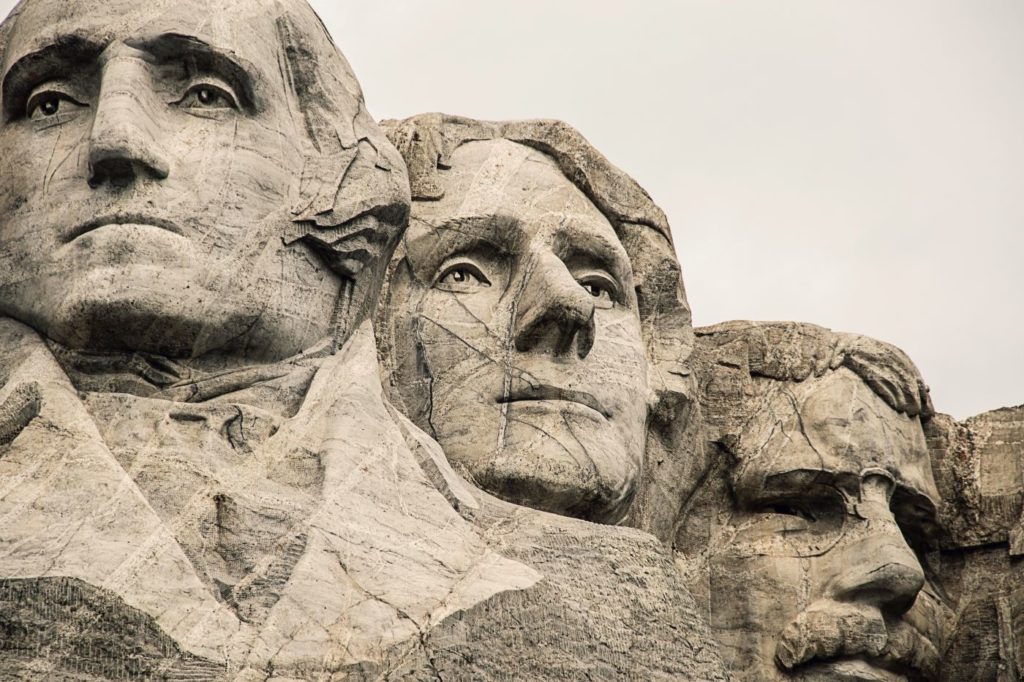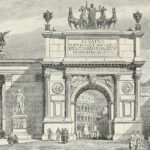Is American conservatism the guardian of liberal ideology? Some factions in the Right’s current debates assert that the American Founding was based on classical liberal ideology, which, they argue, it is the task of conservatism to defend. Perhaps the most notable intellectual champion of this view was the late Claremont professor Harry Jaffa, who argued that American conservatism consisted of preserving and expanding the liberal ideology that he thought was the essence of the Founding.
As I explained in my Public Discourse essay yesterday, this is an attempt to steal an intellectual base, insofar as liberal ideology was only one influence (and not the greatest) among many during the American Founding. The American colonists did not need John Locke’s theories in order to have representative government, trial by jury, and the many other liberal practices they rebelled to protect. Thus, American conservatives who are skeptical of liberal ideology are in no way betraying their patrimony. Elevating the liberal theory of Locke and other Enlightenment thinkers to the preeminent place presumes what is in dispute, which is whether liberal ideology is superior to the alternatives and therefore that the Founding should be understood in light of liberal theory as its highest constitutive element.
Consent of the Governed
Historical accuracy is not the only challenge facing the attempt to define the United States as a project of Enlightenment liberalism. A theoretical difficulty with practical consequences is that the American Founding never fulfilled the requirements of classical liberal political theory. As Jaffa noted, liberal theory asserts that “it is the unanimous consent of equals that transforms a number of individuals into a people.” The doctrine of human equality demands the consent of the governed—all of them. Everyone must agree to the initial social contract that legitimizes subsequent limited majority rule. This may seem an abstract point, but it precipitates a theoretical crisis for those insisting that America was founded as an expression of classical liberal theory; and their responses—certainly Jaffa’s response—reveal the contradictions and despotic potential at the heart of ideological liberalism.
Start your day with Public Discourse
Sign up and get our daily essays sent straight to your inbox.Historically, nothing in the nature of a unanimous social contract can be found in the history of the colonies at the time of their rebellion and union into the United States. This was not for a lack of concern about the problem: after the break from Great Britain, some of the more theoretically preoccupied patriots speculated about whether the colonies, or their constitutive localities, or even all Americans, were in a state of nature relative to each other. But nothing close to unanimous consent was ever achieved, or even really sought after.
The revolution, after all, was the work of a minority. Estimates place the number of Tory loyalists at around that of the revolutionary patriots, with many other colonists being, so far as possible, neutral. Had a referendum on independence been conducted, it is by no means clear that “leave” would have won. Furthermore, a majority of adults were excluded from political participation, on account of being female, propertyless, indentured, or enslaved. If the Revolution resulted in the formation of a new social contract and government, it was not the product of unanimous consent, or even of majority rule, but of a minority of a minority.
Thus, by the logic of classical liberal theory, the United States appears to have been illegitimate from the start, as it was not formed by the unanimous consent of equals. Jaffa offered two ways out of this conundrum, both of which have significant repercussions for how we view our government today. Both his influence and his clarity—he did not shy away from hard conclusions—make addressing these essential for conservatives who debate the nature of our nation’s liberal heritage.
Jaffa’s first method of legitimation is to understand the requirement for unanimous consent as having an ontological primacy, rather than a temporal one. The idea of the state of nature, and the natural equality of man it supposes, explain the rights and duties of just government, even if historically there never was any such state of nature or formation of a social contract. The liberal model of how a people is established from the state of nature should be taken seriously, but not literally. The unanimous consent that human equality requires to form a government from the state of nature is an event, not in the past, but instead in our hearts, insofar as we adhere to the ideal of equality. A government dedicated to liberal equality may therefore be justified in the present, regardless of the actual history of its formation.
This construct makes adherence to liberal ideology, rather than precedent or even popular approval, the source of governmental legitimacy. Liberalism is the standard of justice, and governments that do not strive toward it delegitimize themselves, regardless of how longstanding they are, how many elections they win, or even how well they govern. For a current example, observe the denunciations of the governments of Poland and Hungary, which have repudiated liberal ideology while remaining broadly democratic.
That the governed may consent to governments that reject liberal ideology is a problem for liberal theory. Jaffa addressed this difficulty by declaring that those who are unfit to rule themselves may be ruled for their own good. His vindication of the minority that were responsible for the American Founding depended on excluding those who were opposed to independence from the requirements of unanimous consent. He accomplished this by arguing that the first requirement for being capable of self-government is accepting the liberal theory of self-government.
Enlightened Despotism
Liberalism is thus the only legitimate form of government among enlightened men, but there are different rules for the unenlightened. Jaffa endorsed J. S. Mill’s justification for despotism (enlightened, of course) in dealing with barbarians, asserting that “the civilized may have to govern the uncivilized without their consent. Even extreme forms of despotism may be justified if they are necessary.” Similarly, dissenters from the liberal order are automatically excluded from the requirement for unanimous consent in forming a social compact, and they may also justly be excluded from participation in the subsequent government by majority rule.
Thus, in the American context, the revolutionaries had the right, even the duty, to exclude and exile (violently if necessary) the Tories from politics. The Tories had excommunicated themselves from the creed of liberalism and, therefore, from any right of participation in the formation of a government that was to be based on liberalism. As Jaffa put it, “the acceptance of the idea of human equality, as that idea was comprehended within ‘the laws of nature and of nature’s God,’ would appear to be the necessary condition par excellence for defining who might participate in a free election.” Liberal democracy requires that believers in liberalism control participation in government and that dissidents may justly be excluded from political power and participation.
The theoretical liberal requirement for unanimous consent in forming a government is secured (ontologically, though not historically) by denying, violently if necessary, the rights of all non-liberals to participate in government. Jaffa believed that the Declaration’s right to revolution “is a right to use violence against anyone who would deny us the enjoyment of our rights. . . . [A]n enlightened minority has the same right to use force against a brutal majority as an enlightened majority has against a brutal king.” The maxim that government derives its just powers from the consent of the governed only applies when the governed are liberals who recognize their consent as the source of just government. Liberals, even if they are a small minority, may need to rule non-liberals despotically until they are converted to liberalism. All men are equal, but liberals are more equal than others.
Thus does the theoretical liberalism of unanimous consent in forming a government, followed by majority rule in administering it, justify in practice the rule of a self-declared enlightened minority over an ostensibly unenlightened majority. And the enlightenment that certifies the minority’s fitness to rule is belief in the principles of liberalism. At the heart of Jaffa’s teaching is the right of enlightened liberals to resist non-liberals violently, conquer them, and despotically rule over them until they convert to the true faith of liberalism. This argument for enlightened liberal despotism is not often made explicit, but it is part of the set of ideas that Jaffa and his many disciples have sought to enshrine as the heart of American conservatism.
Those of us who are not charmed at the prospect of liberal despotism might question the benevolence of our would-be overlords, who would surely and sorely be tempted to govern in their own self-interest, rather than on behalf of (eventual) equality. We may also recall C. S. Lewis’s insight that “a tyranny sincerely exercised for the good of its victims may be the most oppressive. . . . [T]hose who torment us for our own good will torment us without end, for they do so with the approval of their own conscience.” Furthermore, we might be skeptical that those who practice this enlightened despotism will respect the procedural and constitutional limitations that some “conservative classical liberals” place their trust in.
Conservative or classical liberals might reply that liberalism is not a suicide pact, and that liberal regimes are not obligated to extend full civic equality to those who would use it to destroy liberalism: per Karl Popper, liberalism may be illiberal toward those who are themselves illiberal, and who are thereby self-excommunicated from the liberal order. This is a plausible argument, but it gives the lie to liberalism’s claims to neutrality. The liberal promise to be impartial in disagreements over the ultimate end of human beings, the nature of the good life, and the highest good, is deceptive. Liberalism is not a neutral framework in which those with disparate views on these subjects may live in peace. Rather, it is an armed doctrine, with metaphysical presumptions of its own and disciples who aim to subjugate non-liberals unless they convert.
Implications for Policy Today
This ideological liberalism has implications for American policy, foreign and domestic. Jaffa provided a theoretical justification for the view that the United States government is the champion of a militant liberal ideology, that justifies violence against regimes that do not adhere to it and the suppression of citizens who do not accept it. If the United States is a creedal nation, and if that creed is the sole source of legitimate government, then dissenters from this revolutionary creed are in fact enemies of the people and the state. And foreign regimes that are not founded on this liberal faith must be regarded as intrinsically oppressive to their people and threatening to the United States.
This ideological outlook had a dominant place in the foreign policy of George W. Bush’s administration; and while the errors of the effort to democratize the Middle East by force of arms have decreased the ideology’s allure, it still has advocates in the conservative movement, and American troops still fight in Iraq and Afghanistan. Nor is the influence of this liberal view confined to democracy-spreading foreign policy hawks who want to bomb Iran and broadcast liberal propaganda into Hungary.
Domestic policies also depend on whether or not our nation is defined by liberal political theory and its veneration of individual autonomy. The French–Ahmari debate was precipitated, after all, by “Drag Queen Story Hour” events hosted at public libraries. For French, these efforts at normalizing adult sexual entertainment for children are among the “blessings of liberty.” On matters of religion, French’s doctrines place the government in the untenable position of being strictly neutral between Christ and Satan.
Neutrality may sometimes be a useful legal fiction, but it is a practical impossibility. Thus, while French, as an accomplished lawyer, outclassed Ahmari regarding legal questions during their dispute, he has in turn struggled to address the philosophical issues raised by liberalism’s obvious practical partiality. Liberal ideology is not neutral between competing conceptions of the highest good and the ultimate end of human beings. As Jaffa understood, even if French does not, liberal doctrines necessarily require disenfranchising and punishing those who hold rival beliefs. Liberal ideology is jealous, and will have no other gods before it.
American conservatives should reject this revolutionary liberalism and the attempts to make it the central principle of our national heritage. We need not deny that liberal ideas influenced the Founding, but we ought to follow our forefathers in tempering them. We should take our stand in defense of our national traditions of liberal practice, whose roots are deeper than this liberal ideology that perverts and poisons them. We can defend our patrimony of liberal practices without bending the knee before Enlightenment liberal ideology.














